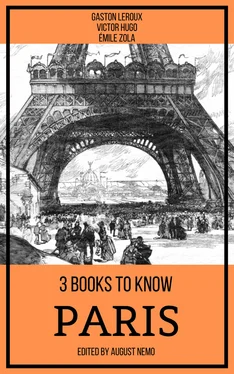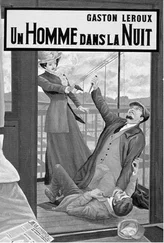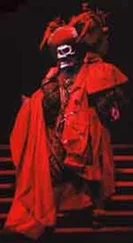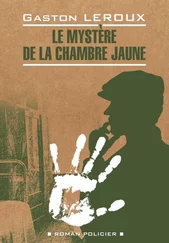There was then neither hatred for the cardinal, nor disdain for his presence, in the disagreeable impression produced upon Pierre Gringoire. Quite the contrary; our poet had too much good sense and too threadbare a coat, not to attach particular importance to having the numerous allusions in his prologue, and, in particular, the glorification of the dauphin, son of the Lion of France, fall upon the most eminent ear. But it is not interest which predominates in the noble nature of poets. I suppose that the entity of the poet may be represented by the number ten; it is certain that a chemist on analyzing and pharmacopolizing it, as Rabelais says, would find it composed of one part interest to nine parts of self-esteem.
Now, at the moment when the door had opened to admit the cardinal, the nine parts of self-esteem in Gringoire, swollen and expanded by the breath of popular admiration, were in a state of prodigious augmentation, beneath which disappeared, as though stifled, that imperceptible molecule of which we have just remarked upon in the constitution of poets; a precious ingredient, by the way, a ballast of reality and humanity, without which they would not touch the earth. Gringoire enjoyed seeing, feeling, fingering, so to speak an entire assembly (of knaves, it is true, but what matters that?) stupefied, petrified, and as though asphyxiated in the presence of the incommensurable tirades which welled up every instant from all parts of his bridal song. I affirm that he shared the general beatitude, and that, quite the reverse of La Fontaine, who, at the presentation of his comedy of the “Florentine,” asked, “Who is the ill-bred lout who made that rhapsody?” Gringoire would gladly have inquired of his neighbor, “Whose masterpiece is this?”
The reader can now judge of the effect produced upon him by the abrupt and unseasonable arrival of the cardinal.
That which he had to fear was only too fully realized. The entrance of his eminence upset the audience. All heads turned towards the gallery. It was no longer possible to hear one’s self. “The cardinal! The cardinal!” repeated all mouths. The unhappy prologue stopped short for the second time.
The cardinal halted for a moment on the threshold of the estrade. While he was sending a rather indifferent glance around the audience, the tumult redoubled. Each person wished to get a better view of him. Each man vied with the other in thrusting his head over his neighbor’s shoulder.
He was, in fact, an exalted personage, the sight of whom was well worth any other comedy. Charles, Cardinal de Bourbon, Archbishop and Comte of Lyon, Primate of the Gauls, was allied both to Louis XI., through his brother, Pierre, Seigneur de Beaujeu, who had married the king’s eldest daughter, and to Charles the Bold through his mother, Agnes of Burgundy. Now, the dominating trait, the peculiar and distinctive trait of the character of the Primate of the Gauls, was the spirit of the courtier, and devotion to the powers that be. The reader can form an idea of the numberless embarrassments which this double relationship had caused him, and of all the temporal reefs among which his spiritual bark had been forced to tack, in order not to suffer shipwreck on either Louis or Charles, that Scylla and that Charybdis which had devoured the Duc de Nemours and the Constable de Saint-Pol. Thanks to Heaven’s mercy, he had made the voyage successfully, and had reached home without hindrance. But although he was in port, and precisely because he was in port, he never recalled without disquiet the varied haps of his political career, so long uneasy and laborious. Thus, he was in the habit of saying that the year 1476 had been “white and black” for him—meaning thereby, that in the course of that year he had lost his mother, the Duchesse de la Bourbonnais, and his cousin, the Duke of Burgundy, and that one grief had consoled him for the other.
Nevertheless, he was a fine man; he led a joyous cardinal’s life, liked to enliven himself with the royal vintage of Challuau, did not hate Richarde la Garmoise and Thomasse la Saillarde, bestowed alms on pretty girls rather than on old women,—and for all these reasons was very agreeable to the populace of Paris. He never went about otherwise than surrounded by a small court of bishops and abbés of high lineage, gallant, jovial, and given to carousing on occasion; and more than once the good and devout women of Saint Germain d’ Auxerre, when passing at night beneath the brightly illuminated windows of Bourbon, had been scandalized to hear the same voices which had intoned vespers for them during the day carolling, to the clinking of glasses, the bacchic proverb of Benedict XII., that pope who had added a third crown to the Tiara—Bibamus papaliter.
It was this justly acquired popularity, no doubt, which preserved him on his entrance from any bad reception at the hands of the mob, which had been so displeased but a moment before, and very little disposed to respect a cardinal on the very day when it was to elect a pope. But the Parisians cherish little rancor; and then, having forced the beginning of the play by their authority, the good bourgeois had got the upper hand of the cardinal, and this triumph was sufficient for them. Moreover, the Cardinal de Bourbon was a handsome man,—he wore a fine scarlet robe, which he carried off very well,—that is to say, he had all the women on his side, and, consequently, the best half of the audience. Assuredly, it would be injustice and bad taste to hoot a cardinal for having come late to the spectacle, when he is a handsome man, and when he wears his scarlet robe well.
He entered, then, bowed to those present with the hereditary smile of the great for the people, and directed his course slowly towards his scarlet velvet arm-chair, with the air of thinking of something quite different. His cortege—what we should nowadays call his staff—of bishops and abbés invaded the estrade in his train, not without causing redoubled tumult and curiosity among the audience. Each man vied with his neighbor in pointing them out and naming them, in seeing who should recognize at least one of them: this one, the Bishop of Marseilles (Alaudet, if my memory serves me right);—this one, the primicier of Saint-Denis;—this one, Robert de Lespinasse, Abbé of Saint-Germain des Prés, that libertine brother of a mistress of Louis XI.; all with many errors and absurdities. As for the scholars, they swore. This was their day, their feast of fools, their saturnalia, the annual orgy of the corporation of Law clerks and of the school. There was no turpitude which was not sacred on that day. And then there were gay gossips in the crowd—Simone Quatrelivres, Agnes la Gadine, and Rabine Piédebou. Was it not the least that one could do to swear at one’s ease and revile the name of God a little, on so fine a day, in such good company as dignitaries of the church and loose women? So they did not abstain; and, in the midst of the uproar, there was a frightful concert of blasphemies and enormities of all the unbridled tongues, the tongues of clerks and students restrained during the rest of the year, by the fear of the hot iron of Saint Louis. Poor Saint Louis! how they set him at defiance in his own court of law! Each one of them selected from the new-comers on the platform, a black, gray, white, or violet cassock as his target. Joannes Frollo de Molendin, in his quality of brother to an archdeacon, boldly attacked the scarlet; he sang in deafening tones, with his impudent eyes fastened on the cardinal, “Cappa repleta mero!”
All these details which we here lay bare for the edification of the reader, were so covered by the general uproar, that they were lost in it before reaching the reserved platforms; moreover, they would have moved the cardinal but little, so much a part of the customs were the liberties of that day. Moreover, he had another cause for solicitude, and his mien as wholly preoccupied with it, which entered the estrade the same time as himself; this was the embassy from Flanders.
Читать дальше









